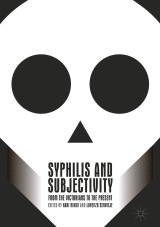Details

Syphilis and Subjectivity
From the Victorians to the Present|
117,69 € |
|
| Verlag: | Palgrave Macmillan |
| Format: | |
| Veröffentl.: | 14.12.2017 |
| ISBN/EAN: | 9783319663678 |
| Sprache: | englisch |
Dieses eBook enthält ein Wasserzeichen.
Beschreibungen
<div>This book demystifies the cultural work of syphilis from the late nineteenth century to the present. By interrogating the motivations that engender habits of belief, thought, and conduct regarding the disease and notions of the self, this interdisciplinary volume investigates constructions of syphilis that had a significant role in shaping modern subjectivity. Chapters draw from a variety of scholarly methods, such as cultural and literary studies, sociology, and anthropology. Authors unravel the representations and influence of syphilis in various cultural forms: cartography, medical writings, literature, historical periodicals, and contemporary popular discourses such as internet forums and electronic news media.</div><div><br></div><div>Exploring the ways syphilitic rhetoric responds to, generates, or threatens social systems and cultural capital offers a method by which we can better understand the geographies of blame that are central to the conceptual heritage of the disease. This unique volume will appeal to students and scholars in the medical humanities, medical sociology, the history of medicine, and Victorian and modernist studies.<br></div>
<p>Introduction; Part I: Structuring Syphilis.- Kari Nixon and Lorenzo Servitje.- 1. Medical Mappings of Syphilis in the Late Nineteenth Century; Monika Pietrzak-Franger.- 2. Stigmatization, Syphilis, and Prostitution: The Discursive Construction of Sex Workers, Disease, and Feeblemindedness; J.L. Schatz.- 3. Marriage, Motherhood and the Future of the Race: Syphilis in Late-Victorian and Edwardian Britain; Joanne Townsend.- 4. Suspect Bodies, Suspect Milk: Milk Sharing, Wetnursing, and the Specter of Syphilis in the 21st Century; Beatriz M. Reyes-Foster and Shannon K. Carter.- Part II: Novel Infections.- 5. Not-So-Great Expectations: Pregnancy and Syphilis in Sarah Grand's The Heavenly Twins; Livia Woods.- 6. Unspeakable Horror: Outing Syphilis in Joseph Conrad’s Heart of Darkness; Nicole Cosentino and Wendy Ryden.- 7. “Everybody Has it”: Syphilis and the Human Condition in the Writings of Ernest Hemingway; LisaTyler.</p><p></p><p></p>
<p>Kari Nixon is Assistant professor for English at Whitworth University, USA. Her research focuses on the confluence of microbiology, germ theory, and social norms in the late nineteenth century.</p><p>Lorenzo Servitje is Assistant Professor in the Department of English and Health, Medicine, and Society Program at Lehigh University, USA. His work examines the mutual constitution of literature and medicine in the Victorian era, in addition to representation of medical discourse in popular culture.</p><div><br></div>
This book demystifies the cultural work of syphilis from the late nineteenth century to the present. By interrogating the motivations that engender habits of belief, thought, and conduct regarding the disease and notions of the self, this interdisciplinary volume investigates constructions of syphilis that had a significant role in shaping modern subjectivity. Chapters draw from a variety of scholarly methods, such as cultural and literary studies, sociology, and anthropology. Authors unravel the representations and influence of syphilis in various cultural forms: cartography, medical writings, literature, historical periodicals, and contemporary popular discourses such as internet forums and electronic news media.<div><br></div><div>Exploring the ways syphilitic rhetoric responds to, generates, or threatens social systems and cultural capital offers a method by which we can better understand the geographies of blame that are central to the conceptual heritage of the disease. This unique volume will appeal to students and scholars in the medical humanities, medical sociology, the history of medicine, and Victorian and modernist studies.<br></div>
Discusses increasing attention to the social constructions of specific diseases, particularly Syphilis Examines how the social meanings exceed the medical significance of Syphilis Holds interdisciplinary appeal across the social sciences and humanities, especially medical anthropology/history/literary studies and cultural studies
<div><div><div><p>Discusses increasing attention to the social constructions of specific diseases, particularly Syphilis</p> <p>Examines how the social meanings exceed the medical significance of Syphilis</p> Interdisciplinary appeal across the social sciences and humanities, especially medical anthropology/history/literary studies and cultural studies<p></p></div></div></div>


















